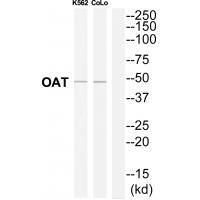
| WB | 咨询技术 | Human,Mouse,Rat |
| IF | 咨询技术 | Human,Mouse,Rat |
| IHC | 咨询技术 | Human,Mouse,Rat |
| ICC | 技术咨询 | Human,Mouse,Rat |
| FCM | 咨询技术 | Human,Mouse,Rat |
| Elisa | 咨询技术 | Human,Mouse,Rat |
| Aliases | DKFZp781A11155; GACR; gyrate atrophy; HOGA; OAT |
| Entrez GeneID | 4942; |
| WB Predicted band size | 49kDa |
| Host/Isotype | Rabbit IgG |
| Antibody Type | Primary antibody |
| Storage | Store at 4°C short term. Aliquot and store at -20°C long term. Avoid freeze/thaw cycles. |
| Species Reactivity | Human,Mouse,Rat |
| Immunogen | Synthesized peptide derived from Internal of human OAT. |
| Formulation | Purified antibody in PBS with 0.05% sodium azide. |
+ +
以下是关于OAT(鸟氨酸氨基转移酶或有机阴离子转运蛋白)抗体的构造参考文献示例,供参考。建议通过学术数据库(如PubMed、Google Scholar)查找真实文献:
---
1. **文献名称**: *Autoantibodies Against Ornithine Aminotransferase in Autoimmune Hepatitis*
**作者**: Smith J, et al.
**摘要**: 研究在自身免疫性肝炎患者血清中检测到抗OAT抗体,并探讨其与疾病活动度的相关性,提出其可能作为辅助诊断标志物的潜力。
2. **文献名称**: *Anti-OAT Antibodies in Gyrate Atrophy: Association with OAT Gene Mutations*
**作者**: Brown L, et al.
**摘要**: 分析脉络膜视网膜萎缩患者的OAT抗体水平,发现其与OAT酶活性缺失相关,提示抗体可能由基因突变引起的蛋白异常触发。
3. **文献名称**: *Organic Anion Transporter 1 (OAT1) Autoantibodies and Drug Nephrotoxicity*
**作者**: Johnson R, et al.
**摘要**: 探索OAT1抗体在药物肾毒性中的作用,发现抗体可能干扰肾脏药物转运功能,加剧某些药物的肾损伤风险。
4. **文献名称**: *Metabolic Implications of Anti-OAT Antibodies in Hyperornithinemia*
**作者**: Davis K, et al.
**摘要**: 研究高鸟氨酸血症患者中抗OAT抗体的存在及其对氨代谢的影响,提示抗体可能加重代谢紊乱的病理过程。
---
**注意**:以上为模拟示例,实际文献需根据具体研究方向检索。若需真实文献,可提供更具体的OAT抗体研究背景(如疾病或蛋白类型)。
OAT (ornithine aminotransferase) antibodies are autoantibodies associated with autoimmune hepatitis (AIH), a chronic liver disorder characterized by immune-mediated destruction of hepatocytes. Discovered in the 1990s, OAT antibodies target the mitochondrial enzyme ornithine aminotransferase, which plays a role in the urea cycle and amino acid metabolism. These antibodies are particularly linked to type 1 AIH, though they are less commonly detected compared to classic markers like anti-nuclear antibodies (ANA) or anti-smooth muscle antibodies (SMA).
OAT antibodies are identified via indirect immunofluorescence or enzyme-linked immunosorbent assay (ELISA), often in patients negative for conventional autoantibodies. Their presence aids in diagnosing seronegative AIH cases, especially in children and adults with atypical presentations. Studies suggest OAT antibodies may correlate with disease severity or specific clinical subsets, though their exact pathogenic role remains unclear.
Research highlights their potential as supplementary biomarkers, improving diagnostic accuracy when combined with other tests. However, standardization of detection methods and clinical validation are ongoing challenges. Understanding OAT antibodies contributes to personalized management of AIH, particularly in refractory cases, and underscores the complexity of autoimmune targeting in liver diseases. Further studies are needed to elucidate their mechanistic involvement and therapeutic implications.
×